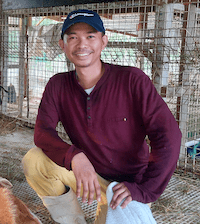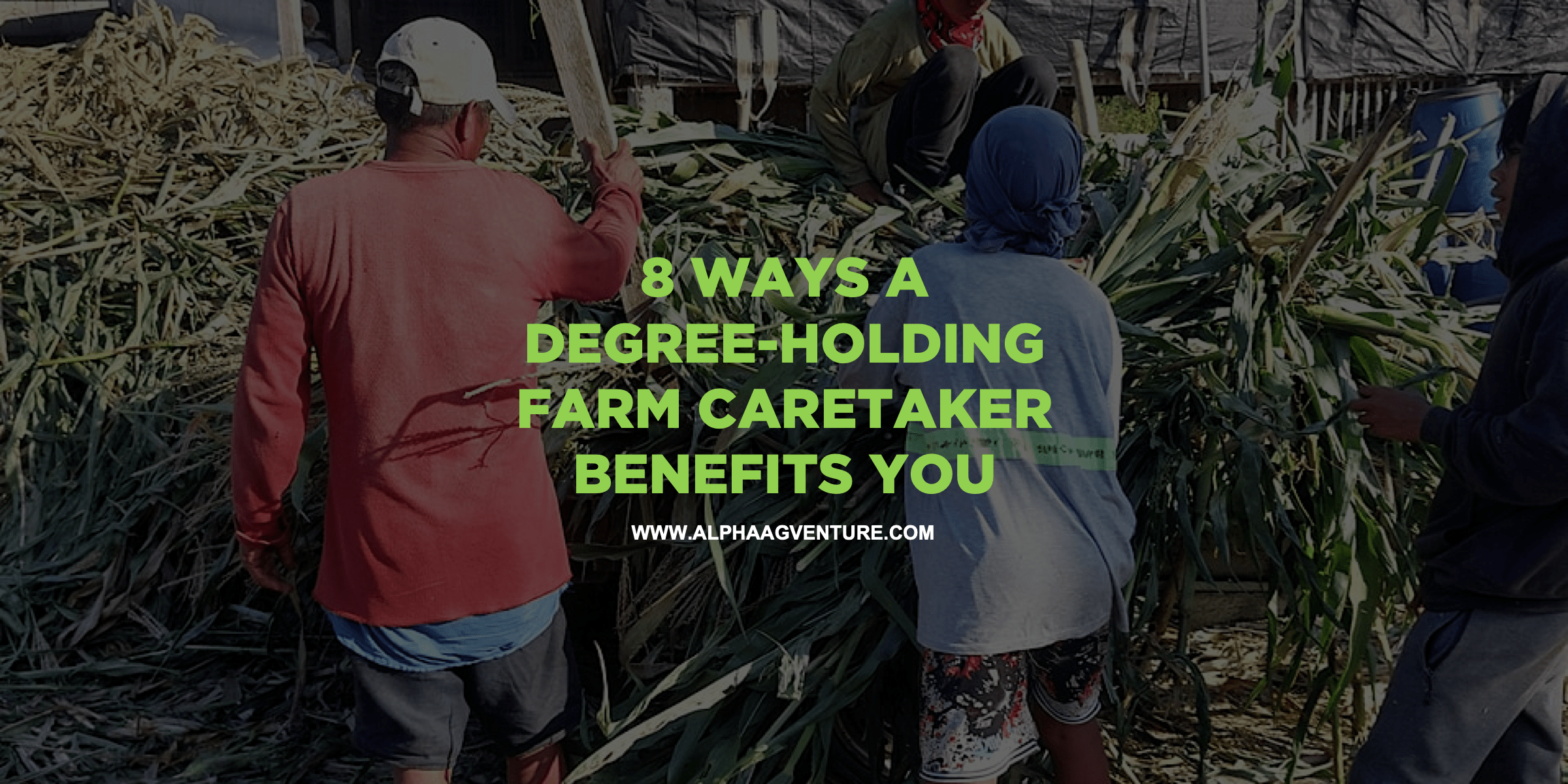When hiring a farm caretaker, many farm owners choose based on availability rather than qualifications. They believe that anyone willing to do the work can take care of livestock. While experience is valuable, relying solely on untrained caretakers can lead to inefficiencies, mistakes, and financial losses.
I strongly believe that hiring a farm caretaker with a degree in agriculture or animal science is the smarter choice. A trained professional understands livestock management at a scientific level. They can apply proper techniques, prevent costly errors, and improve farm productivity. Here’s why hiring a degree-holding caretaker benefits you in the long run.
1. Higher Level of Expertise
A degree-holding caretaker brings a wealth of specialized knowledge to your farm. They have undergone formal education in areas such as animal science, nutrition, and farm management, equipping them with the skills to make informed decisions that enhance productivity. This expertise allows them to implement best practices tailored to your farm’s specific needs.
In contrast, untrained caretakers may rely on traditional methods or personal experience, which might not align with modern agricultural standards. The lack of formal training can lead to inefficiencies and missed opportunities for improvement. By hiring a degree-holding caretaker, you’re investing in someone who can apply the latest research and techniques to benefit your farm.
Consider this: Would you entrust your health to an untrained individual? Similarly, the well-being of your livestock and the success of your farm deserve the attention of a qualified professional.
2. Better Disease Prevention and Management
Disease outbreaks can devastate livestock operations, leading to significant financial losses. A trained caretaker is proficient in identifying early signs of illness and implementing effective biosecurity measures. Their knowledge in disease prevention is crucial for maintaining a healthy herd.
Studies in the Philippines have demonstrated that farms employing trained personnel experience significant improvements in animal health and productivity. For example, research evaluating backyard goat raisers who participated in the Farmer Livestock School on Integrated Goat Management (FLS-IGM) found that enhanced stockmanship competence led to increased goat productivity and a 127.34% higher median net income for farmers.
Additionally, the Department of Agriculture’s National Livestock Program emphasizes the importance of training local government unit personnel and agricultural extension workers in modern production and health management techniques. This initiative aims to improve livestock performance and adaptability, directly contributing to a more food-secure Philippines.
These findings underscore the value of hiring caretakers with formal education in agriculture or animal science to enhance farm profitability and sustainability.
Can you afford the risk of disease spreading due to inadequate management? Investing in a knowledgeable caretaker can safeguard your livestock and your livelihood.
3. Efficient Feeding and Nutrition Management
Proper nutrition is the cornerstone of livestock health and productivity. A degree-holding caretaker has the expertise to formulate balanced diets, ensuring optimal growth and production. Their understanding of animal nutrition helps in reducing feed costs while maximizing output.
Untrained workers may lack this critical knowledge, leading to overfeeding, underfeeding, or nutritional imbalances. Such practices can result in poor animal health and increased expenses. By employing a trained professional, you ensure that your livestock receives the precise nutrition they need to thrive.
Have you noticed inconsistencies in your livestock’s growth or production? A qualified caretaker can identify and rectify nutritional issues, leading to more consistent and profitable outcomes.
4. Improved Breeding and Reproduction Success
Effective breeding programs are essential for the sustainability of livestock operations. A trained caretaker understands reproductive physiology, genetic selection, and breeding techniques, leading to higher conception rates and healthier offspring.
Without this expertise, untrained workers may miss critical signs of estrus or make poor breeding decisions, resulting in reduced fertility and financial losses. A degree-holding caretaker can implement strategic breeding plans that align with your production goals.
Are you experiencing low reproductive success rates? A professional caretaker can assess and enhance your breeding program, contributing to the long-term success of your farm.
5. Proper Farm Record-Keeping and Data Analysis
Accurate record-keeping is vital for monitoring progress and making informed decisions. A degree-holding caretaker is trained in maintaining detailed records of animal health, production metrics, and financial data. This systematic approach enables the identification of trends and areas for improvement.
In contrast, untrained workers may overlook the importance of documentation, leading to disorganized records and missed opportunities for optimization. A professional caretaker ensures that all essential information is recorded and analyzed, facilitating strategic planning and efficient farm management.
Do you have the data needed to make strategic decisions for your farm? A qualified caretaker can provide the insights necessary to drive your operation forward.
6. Compliance With Farming Regulations
Agricultural operations are subject to various regulations concerning animal welfare, environmental protection, and food safety. A trained caretaker is well-versed in these laws and ensures that your farm remains compliant, thereby avoiding potential fines and legal issues.
Untrained workers may inadvertently violate regulations due to a lack of awareness, putting your farm at risk. Employing a degree-holding caretaker provides peace of mind, knowing that your operations adhere to all applicable standards and practices.
Are you confident that your farm meets all regulatory requirements? A knowledgeable caretaker can help navigate the complexities of agricultural laws, safeguarding your business.
7. Ability to Adapt to New Technologies
The agricultural industry continually evolves with advancements in technology. A degree-holding caretaker possesses the foundational knowledge to understand and implement new tools and systems, such as precision farming equipment and data management software. This adaptability enhances efficiency and keeps your farm competitive.
Untrained workers may resist or struggle to integrate new technologies, hindering progress and innovation. A professional caretaker embraces change and leverages technological advancements to improve farm operations.
Is your farm keeping pace with technological advancements? A trained caretaker can lead the way in modernizing your practices, ensuring long-term viability.
8. Long-Term Cost Savings and Profitability
While hiring a degree-holding caretaker may involve a higher initial investment, the long-term benefits far outweigh the costs. Their expertise leads to improved animal health, efficient resource utilization, and enhanced productivity, all contributing to increased profitability.
Untrained workers may save money upfront but can incur higher costs over time due to inefficiencies, mistakes, and lower production levels. Investing in a qualified caretaker ensures that your farm operates at its full potential, maximizing returns and sustainability.
Are short-term savings worth the potential long-term losses? Hiring a trained professional guarantees that your farm remains profitable and well-managed for years to come.
Why Expertise Matters in Farm Management
Hiring a degree-holding farm caretaker is not an unnecessary expense—it is a smart investment. I’ve seen firsthand how educated caretakers improve farm operations, prevent losses, and increase profitability. Their expertise ensures that livestock is managed efficiently and in line with the best industry practices.
A farm is a business, and every decision affects its success. Choosing a well-trained caretaker means choosing higher productivity, better animal welfare, and long-term sustainability. In contrast, hiring unqualified caretakers can lead to costly mistakes and lost opportunities.
But finding the right caretaker isn’t always easy. Sorting through unqualified applicants takes time, and the best candidates often go unnoticed. That’s where Farm Staff Finder comes in. Instead of sifting through countless resumes, you receive a pre-screened shortlist of qualified agriculture graduates, saving you time and effort.
So, what kind of farm do you want to run? One that struggles with inefficiencies and losses, or one that thrives under expert management? The choice is clear—hiring a trained expert is always the better decision. And with Farm Staff Finder, finding the right farm caretaker has never been easier.

Mr. Jaycee de Guzman is a self-taught agriculturist and the founder and patriarch of Alpha Agventure Farms, recognized as the leading backyard farm in the Philippines. With a rich background in livestock farming dating back to the early 1990s, Mr. de Guzman combines his expertise in agriculture with over 20 years of experience in computer science, digital marketing, and finance. His diverse skill set and leadership have been instrumental in the success of Alpha Agventure Farms.


